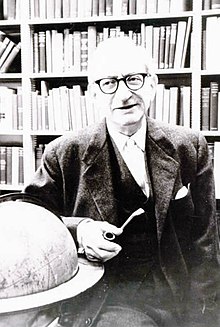Jerome Hall
| Jerome Hall | |
|---|---|

Professor Hall at Indiana University, circa 1970
|
|
| Born | February 4, 1901 Chicago, Illinois |
| Died | March 2, 1992 (aged 91) San Francisco, California |
| Occupation | Professor of Law |
Jerome Hall (February 4, 1901 – March 2, 1992) was an American legal scholar and academic. He is best known for his pioneering work in interdisciplinary legal analysis. Through his work with the United States Department of State, he offered advice and insight to several countries across the globe as they rewrote some or all of their legal codes.
Hall was born in 1901 and grew up in Chicago, Illinois. He studied at the University of Chicago and was a Fulbright scholar, earning both his bachelor's in philosophy and his law degrees. He graduated from law school with honors in 1923.
Hall became a member of the Illinois Bar in 1923, and began his legal career practicing corporate law in Chicago from 1923 to 1929. Even during this early stage of his career, the allure of teaching manifested itself, and he began teaching classes in public speaking and business law at the Indiana University Extension (now IU Northwest) in Gary, Indiana. These early teaching experiences fostered a love of teaching, and in 1929, he left his legal practice behind to teach full time, beginning at the University of North Dakota from 1929 to 1932. From 1932 to 1934 he taught as a special fellow at Columbia University, earning his Doctor of the Science of Law (Jur.Sc.D.) in 1935. From 1934 to 1935 he taught as a Benjamin Research Fellow at Harvard Law School, earning the degree of Doctor of Juridical Science (S.J.D.) in 1935. He next moved to Louisiana State University and taught as a professor of law from 1935-1939, before moving to Indiana. Hall spent the majority of his professional career as a professor of law at Indiana University Bloomington from 1939 to 1970. Upon retiring at 65, he was invited to join the esteemed Sixty-Five Club at University of California, Hastings College of the Law, where he continued to teach until 1986.
Hall was a renowned scholar in comparative law, criminal law, and jurisprudence. He was among the first scholars to analyze legal problems through an interdisciplinary approach. He published his first book, Theft, Law and Society, in 1935; even then his interdisciplinary approach to legal analysis could be seen: “One great effect is and will be the fact that it stimulates one’s thinking along all the allied fields…. The author realizes that crime is behavior. If those who defend individualization of punishment and those who are sceptical [sic] of all individualization of punishment will read this chapter, I think that there will be much more sense displayed in the writing and the talking on this subject.” In one of his best known works, General Principles of Criminal Law, Hall developed a single concept of mens rea, a common law principle today regarded as a critical element of proving culpability for a crime. Readings in Jurisprudence, first published in 1938, has seen multiple editions and was popular both in the United States and in England. His writings on criminal law theory became well known among scholars. "Professor Hall has added another book to his already long list of distinguished publications. [Studies in Jurisprudence and Criminal Theory] is not a self-contained segment of work, but, rather, a cross section of works, and not just of any scholar, but of an unusually original thinker. Moreover, the subjects joined in this book have rarely, if ever, been combined in this country. The result of this joinder is a new area of inquiry, criminal theory." Late in his career, Hall’s research interests shifted to a focus on law and religion, and he became involved with the Harvard Divinity School and Berkeley’s Pacific School of Religion, speaking and writing on the topic; through this new interest, he was asked to be a founding member of the Association of American Law Schools’ Section on Law and Religion, and was the first director of the Council on Religion and Law, a non-profit organization that came out of a series of discussions and conferences at Harvard in the 1970s. A full bibliography of his written works can be found on the Jerome Hall Law Library website.
...
Wikipedia
